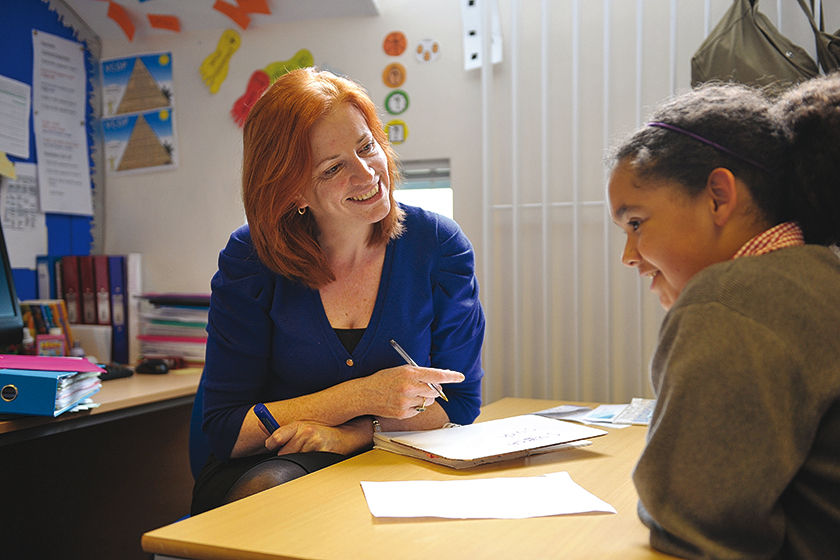The School House Guide to Dyslexia
By
8 years ago
How to spot the signs, how to teach children with dyslexia, and everything you need to know about homeschooling

Do you think your child might be dyslexic? Or wondering whether they might need a dyslexia test? Read our guide to dyslexia, where you will find some answers to your questions.
How do you look for the signs of dyslexia?
John Floyd, headmaster of Bruern Abbey, gives advice on what to do if you think your child might be dyslexic.
1. Try not to panic
This is a learning difficulty, not an illness. It will take time to meaningfully diagnose the existence or extent of a child’s dyslexia, so please don’t rush around frenetically trying to put an emergency rescue package together. You will most likely upset and demotivate your son or daughter in all things academic in the process. Start reading up on the topic instead, either on the internet or in one of the plethora of books on the subject.
2. See the specialists
Book an assessment date with an educational psychologist. It may seem strange to do this so quickly but there will probably be a lengthy waiting list for most good educational psychologists so get the process started promptly. Also get their eyesight and hearing checked, approximately one in every eight boys we assess at Bruern will have an issue with seeing or hearing what’s going on in class.
3. Arrange to meet with the school to share your concerns
See the head of Special Needs and whoever has overall responsibility for your son’s academic studies. They may well need to revert to your child’s teachers for more detailed feedback on his behaviour in class and the work he produces, so please do not expect a master plan instantaneously. The information from the school will also be very helpful for the educational psychologist so please make sure you share all thoughts, opinions and findings.
Hopefully these three steps should have enhanced your awareness of any potential dyslexia, put the school onto the case and resulted in a suitable amount of information for an Educational Psychologist to undertake a meaningful assessment. They will provide you with guidance going forward, to help your child’s individual academic difficulties, but do not expect them to advise on choosing a suitable school – this is not their remit.
If you DO get a dyslexia diagnosis
Annabel Heseltine advises on what to do when your child has dyslexia:
1. Find people to support you quickly. You don’t need to be alone.
2. Get an ed-psych report done. It’s the first stage in supporting your child. Ask the school about IEP’s, individual education plans, which should be re-assessed every two to three weeks.
3. Get your child’s eyes thoroughly checked by an optician who specialises in dyslexia. Colour overlays can help reading and/or they may have co-existing eye difficulties.
4. Most mainstream teachers are not trained in dyslexia, so be vigilant. My second son told me he was bad at maths but when I checked his work I discovered that his correct answers hadn’t been ticked because the numbers were back to front. Equally, there are some teachers who just get them.
5. Many dyslexics are highly visual and learn differently so play to their learning strengths, introduce them to mind-mapping and similar tools.
6. Studies from Yale suggest that there is no gender preference in dyslexia so be vigilant with daughters. Watch out for reports and suggestions that she is lazy when you know she isn’t. If she cannot remember things, finds spelling difficult or gets confused, ask the question; is she dyslexic?
7. Work to their strengths. Find out what they are good at and praise it. If they are excited by, or are good at something, their academic difficulties will not matter as much.
8. Your child will always be dyslexic but eventually they will learn to cope with it and they will be okay!
What next?
Whether you decide to provide extra tutoring support once you have a dyslexia diagnosis, or you want to try homeschooling, help is on hand.
Alex Dyer, managing director of Tutor House, a London based private tutoring agency, offers his advice on teaching children with dyslexia:
What are the effects of dyslexia?
Research suggests that individuals with dyslexia have great difficulties in fluent and/or accurate word identification, often resulting in a slower reading ability, poor concentration, difficulty with spelling and grammar and in some cases trouble with organisation and planning.
A key concern for people with dyslexia is the lack of confidence and the negative effect it can have on a student’s self-esteem. Low self-esteem leads to other challenges such as a lack of motivation, concentration, and self-belief and, in some cases, anxiety.
Tips for teaching students with dyslexia:
1. Be as visual as you can with your teaching. Dyslexics are visual thinkers, so try to include diagrams, flow charts and pictures wherever possible.
2. Think about the level of distraction around the classroom and how you can reduce such disruptions. Working in a quiet, comfortable room with as little to distract the brain as possible will allow students to focus and therefore improve their concentration.
3. Play to the strengths of dyslexia whilst teaching. Really think about the positives – creativity, imagination and a hands-on approach; and integrate them into your teaching techniques.
4. Use mind maps when teaching new and intimidating subjects. Mind maps work the way the brain works, which isn’t in nice neat lines. Mind maps are a very visual way of teaching and, because the brain best memorises keywords and images, they are ideal for teaching students with dyslexia.
5. Help to develop organisational skills that will benefit them for the rest of their lives. Use colour-coded folders to separate different subjects or subject topics and encourage them to implement and stick to a daily routine. Schedules are very useful for individuals with dyslexia as they help them know what to expect and what is coming up next.
6. Use approved specialist software to diversify teaching techniques and encourage willingness to learn. Software such as word and grammar based games; word processors as well as digital voice recording are useful for teaching dyslexic students. Get creative and make it fun, they will respond to new and exciting teaching techniques.
7. Students with dyslexia may struggle with short-term memory and concentrating for long periods of time. Be aware that you may have to repeat yourself often and try to break up the lesson with short breaks such as learning games, chats and active learning techniques.
8. Focus on verbal reasoning. Don’t just hand out sheets of paper for the student to read, as they may struggle to absorb and understand the information. Discuss the topics with them and engage them in conversation; it’s a much more effective way of teaching.

Homeschooling dyslexic children
‘Dyslexic children struggle more than others when it comes to education, so it’s no surprise that the option of homeschooling is often considered,’ says Mike James of Moon Hall College. Here, Mike lays out the arguments for and against homeschooling for children with dyslexia.
The Benefits of Homeschooling
It has been widely regarded by many parents of dyslexic pupils that taking a year out to study at home can be very effective for educational development.
As a parent, your role will be different to those who have to teach a class of pupils. Instead of having to think about a number of different pupils at one time, your job will be simplified in the sense that you’re only looking out for the personal requirements and preferences of your child. This makes it easier when planning lessons and using teaching resources.
It’s much easier for you to notice when your child is feeling a little overwhelmed by all the work you’re doing, so when this happens you can take a break or move on to something else.
Textbooks are often required in school environments as they are one of the easiest ways to provide a number of pupils with the information they need to complete their work. Homeschooling a child with dyslexia means that you aren’t pressured to use text books at all and can instead use other productive methods of teaching that suit your child.
Homeschooling means that you can take your child on educational trips at a time that suits you, possibly even at weekends or days when schooling isn’t taking place.
Don’t forget that homeschooling gives you the ideal platform to build an even better relationship with your child. Many parents see very little of their children as a result of school, so having the opportunity to see them and helping them with their education can be a powerful bonding experience.
The Problems with Homeschooling
While homeschooling has proven to be effective in some cases, it’s certainly not the easiest of options. You’ll need to adopt a specialist teaching approach that focuses on maintaining enough patience and understanding to let your child progress. This is certainly not something you’ll learn to do overnight.
You’ll need to have done enough research to know exactly what needs to be taught, when it needs to be taught and how you need to put the information across. Finding this out can be quite difficult if you’re outside the educational environment and you may need to rely on school resources to do so.
You may have a specific set of teaching strategies prepared which is good news, but are they in the best interests of your child? A child with dyslexia requires very specific teaching methods, which may force you to alter your original method of teaching.
The struggle here is that generic teaching resources are far easier to get hold of and these tend to suit children without the specific requirements of dyslexia, so you may have to work even harder to prepare resources for your child.
If you are prepared to offer homeschooling support for your child, you may have to sacrifice a lot of your own time to do so. You won’t be able to take up any new career paths and you’ll have to work outside of the time you’re teaching your child.
Our Conclusion
There are plenty of challenges associated with homeschooling your children, so we’d suggest that you only take it up only if you are fully aware of the changes you may face as a result. While it’s quite difficult to ascertain exactly how well your child is performing at school, it can help to take advantage of schools that are specialists in helping dyslexic children to fulfil their potential.





